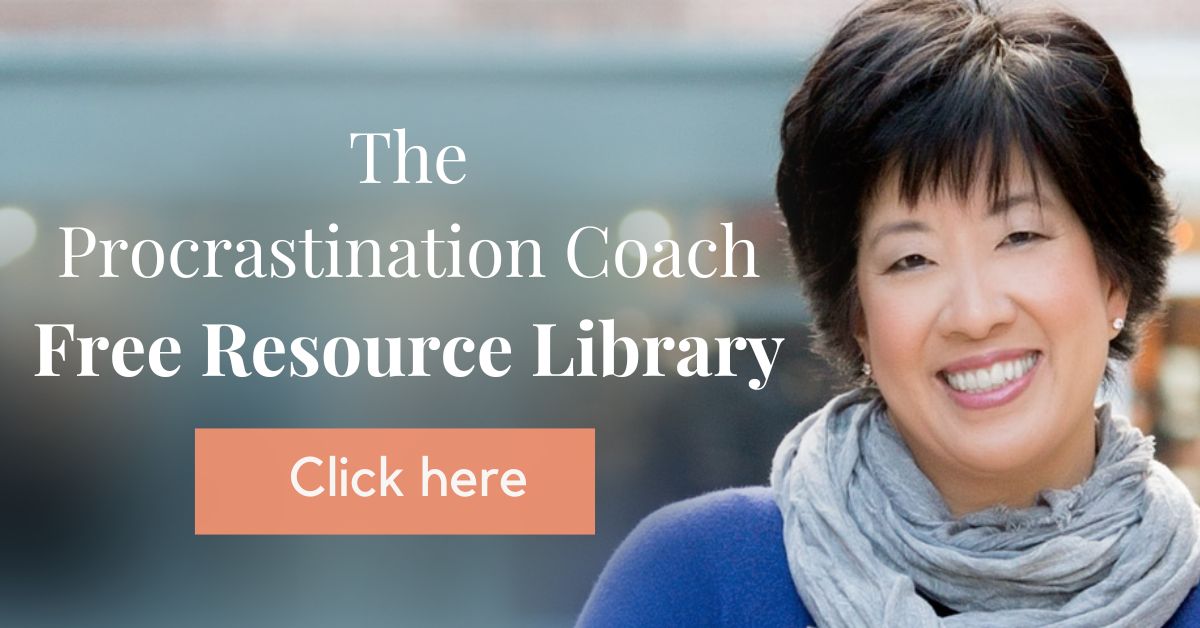I recently answered some podcast interview questions about the relationship between procrastination and creativity in a conversation with Rob Lawrence, host of the Inspirational Creatives podcast. I wanted to share the conversation with you. Rob is a wonderful podcast creator, thinker, and colleague. Please give his Inspirational Creatives podcast a listen when you can.
A Conversation about Procrastination and Creativity with Rob Lawrence, host of the Inspirational Creatives Podcast and Christine Li, Procrastination Coach

Rob Lawrence

Christine Li
Tell us more about yourself. You’re a professional psychologist and procrastination coach: how did you arrive into this field of work?
I arrived into the field of psychology with a good bit of luck since I was really uninformed about the entire field and world of psychology after graduating from college. After college, I had a job as a college admissions officer. Through that job, I was able to interview and to speak with hundreds of teenagers eager to take their next step into college. I was also able to sift through their life stories in their application essays. It was through that process I realized I liked the subject of people’s lives and what they make of them. A couple of courses in psychology later, I had confirmation that the field was a great fit for me. I arrived at the specialty of procrastination several years later. I discovered I was a severe procrastinator myself after having volunteered to lead a workshop on procrastination and after having begun to research the topic.
What aspects of your work are you most passionate about today?
I’m excited about a lot these days. I’m excited about learning how to reach procrastinators who might realize there is an easier way to get through work and life — a procrastination-free way. I’ve been experimenting with different ways of encouraging procrastinators to take the steps to come forward and to start learning how to get things done without stress and strain. I’m also excited about learning these days. With podcasts, blogs, books, colleagues, and conferences, it seems like the sky is the limit. Whatever topic you might want to explore — there’s so much to dive into. I’ve been exploring topics such as the power of subconscious thought and the connection between the mind and body lately.
Who do you typically work with today?
In my private practice and my online work, I work with many college- and graduate school-aged clients, and I work with them through graduation and their post-graduation journey. Many of my clients have a history of procrastination, anxiety, or difficulties getting past emotional blocks. I enjoy working with people in the creative fields, where I feel there is a huge payoff when procrastination is done away with. After procrastination is dealt with, creativity has room to blossom.
How much do you feel procrastination, and this personal business of us being stuck, is a bit of a “taboo” subject today?
I feel talking about procrastination is one of the last remaining taboos. There is such an emphasis on perfection, comparison, and success in our culture that talking openly about being stuck can make us feel incredibly unsafe and vulnerable. I think the perception that there is no way to talk about the issue without hurting our own reputation is one of the main reasons people keep procrastinating — even when it no longer makes any sense and is causing significant harm.
Why do you believe we get stuck as creative beings?
There are so many reasons. But many of those reasons fit into the category of fear. We get stuck because we fear judgment, comparison, criticism, failure, inadequacy, frustration, achievement…the list is pretty much endless. These fears tend to be about what other people will think of us. We worry whether we will still be accepted and loved.
What do you believe is the biggest challenge for anyone wishing to improve his or her own motivation towards overcoming procrastination?
Ironically, oftentimes we pose the greatest obstacle to our own recovery. We fail to see our improvements after becoming accustomed to spotting every fall and failure. Sometimes our mindset is stuck in “nope, no way this is going to happen”-land. That is why having support from other people is often necessary for procrastinators to make meaningful changes that stick. We have to learn how to get out of our own heads.
Where does procrastination typically start?
Procrastination starts when the individual finds him or herself with more work that can be managed in a particular period of time. The other option is when the person finds him or herself with more anxiety about the work that can be managed before the deadline arrives. As you can tell from these descriptions, procrastination can happen at almost any time when there is work to be done.
How can we spot it?
That’s easy. When you find yourself focusing on everything but the work, that is when you are procrastinating. For instance, when you are engaging in “What ifs…?” and worrying, worrying, worrying. And then, of course, there is the classic, “I just need to read one more thing….” If you are complaining, chances are there is a good bit of procrastinating involved in that too.
How much do you believe ego comes into all of this?
Ego is often the reason why procrastination happens in the first place. The ego wants to protect us from danger. When we perceive judgment to be dangerous to us, we then stop working altogether. So, yes, ego is big here.
The good news is, when we take ego out of the equation and do work just for the work’s sake, procrastination becomes unnecessary.
And what about fear?
Fear is, in many ways, just a part of life. There is no way to escape it fully. However, it is critical that we learn how to function in spite of our fears. Be courageous instead of fearful; we are all really safe. Most of us aren’t facing grave dangers when we fuss and fret over our fears. I wish we were all coached into bravery as much as (if not more than) we are coached into fear.
How do we begin to overcome procrastination as creatives?
Step by step. Daily work. Daily progress. Making sure to eliminate the self-critical voice and enabling our creativity to emerge as a result. I think we have creativity inside of us, but we also need to be open to the ideas that swirl around us also, e.g. the inspiration in nature and in daily living. I think it is so important that we take care of our physical bodies and emotional selves in order to have that creative space be at its fullest. There may be real obstacles to our success outside of ourselves, but we cannot turn ourselves against ourselves. We must manage our interior life as best as we can. We must be the champions of our own work.
I remember you talking recently on a webinar with Pam Slim about the benefits of batching similar tasks – can you tell me more about what you mean by that?
Yes. Batching is a terrific technique where you do tasks that are similar to each other with each other to save the energy that it takes to start working. For instance, doing several loads of laundry in quick succession rather than having to do laundry multiple times over the course of a week can be a real timesaver. You save yourself the 5 or 10 minutes it might take you to get over to the laundry room each day and thereby create more time and energy for your creative work. We can use batching as a way of managing our energy across the day to make sure we are working during our hours of peak focus and resting during the times when we feel less energetic.
Why is becoming unstuck so important in the world today?
I’ve come to believe that being stuck, as opposed to being just at rest, is a dangerous position for a person and a physical body to be in. We are moving organisms, and everything inside of us is in motion. I associate wellness with movement these days. It is important to learn how to be unstuck to learn that we each have incredible power and agency in our lives. Learning that lesson well will be life-changing for anyone who gets the message. What is created after the person gets unstuck is just the extra bonus! Just imagine what we can produce.
What does leading a successful life mean to you?
For me, success means being able to lend other people a hand where I know how to. I’m trying to do that with my procrastination work. I try to live focused on joy, and I have been very lucky to have experienced so much of it in my life. Leaving procrastination behind has taught me that we have all that we need inside of us and in our lives as they are. We don’t need to achieve or to have things in order to feel like a success. I guess living without a lot less stress has had me feeling like a success lately.
Who or what’s inspired you most recently?
I am routinely inspired by patients I work with. Trying to break free from the chains of procrastination is no small feat. It has been inspiring to see people reach new highs in productivity and well-being after many years of feeling disorganized and unhappy with themselves. I think anyone who ventures into therapy or coaching or into any path of self-development is inspiring. Anyone who is trying to find and to use their full voice is my hero.
What are you grateful for today?
Everything. Life is really daunting, but it is way more mind-blowingly cool than daunting.
Where can folks find out more about you and your work?
I invite your listeners to my website which is www.procrastinationcoach.com. I have a Free Resource Library (with 13 downloadable items) to share at www.procrastinationcoach.com/freelibrary. I’m creating new content every week, and I look forward to helping the community of people who want to recover from procrastination as best as I can.
Thank you, Rob, for inviting me onto the Inspirational Creatives podcast and for challenging us all to go more deeply into our chosen work.

